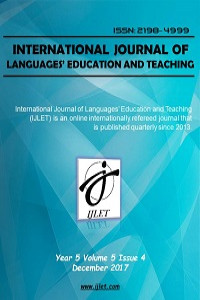Öz
The rapid development of different mediums of communication and the increase in scientific, social, cultural and economic relations with foreign countries, have made the learning of a foreign language a necessity. For this reason the number of people wishing to learn ‘Turkish as a foreign language’ is also increasing day by day. This study was conducted to evaluate the writing skills of university students from different nationalities learning Turkish as a Foreign Language, according to the error analysis approach; and to provide suggestions based on the conclusions of the study that could contribute to the Turkish teaching programs. Research group of the study is composed of 65 students who studied at Izmir Dokuz Eylül University Language Research and Teaching Center during the 2015-2016 academic year. Students age range was 18-34 and % 35.4 were Bachelors % 36,9 Master, % 27.7 PHD students. The data used in the study comprises written expression sections from the Certificate Test given at levels A2, B1 and B2 to students. The morphophonologic, morphologic, syntactic, semantic and orthographic errors made by the students in this test were analyzed according to the error analysis method. The error profile was evaluated comparatively according to student language level as well as the intralingual developmental errors framework. The related examples were given out by not distorting the original statements of students. Result identified B1 as the level most associated with student error; while inaccuracies were most frequently seen in the area of the punctuation and spelling. Among a total of 6156 errors, 37.1% were classified as orthographic, 23.4% as morphologic, 23.3% as syntactic, 8.4% as phonemics and 7.8% were identified as semantic errors.
Anahtar Kelimeler
Turkish as a foreign language written expression error analysis intralingual errors
Kaynakça
- Açık, F. (2008). Türkiye’de Yabancılara Türkçe Öğretilirken Karşılaşılan Sorunlar ve Çözüm Önerileri. Uluslararası Türkçe Eğitimi ve Öğretimi Sempozyumu Bildirisi. Doğu Akdeniz Üniversitesi Eğitim Fakültesi Türkçe Eğitimi Bölümü, Lefkoşa.
- Aytan, T. ve Güney, N. (2015). Türkçeyi Yabancı Dil Olarak Öğrenen Öğrencilerin Yazılı Anlatımlarında Karşılaşılan Sorunlar (Yıldız Tömer örneklemi). International Journal of Languages’ Education and Teaching. 3(2), 275- 288.
- Boylu, E., Güney, E. Z. ve Özyalçın, K. E. (2017). Yanlış Çözümleme Yaklaşımına Göre Türkçeyi Yabancı Dil Olarak Öğrenen B1 Seviyesi Öğrencilerinin Yazılı Anlatımlarının Değerlendirilmesi. International Journal of Languages’ Education and Teaching. 5(3), 184-202.
- Bölükbaş, F. (2011). Arap Öğrencilerin Türkçe Yazılı Anlatım Becerilerinin Değerlendirilmesi. Turkish Studies. 6/3: 1357- 1367.
- Brown, H. D.(2000). Principles of Language Learning and Teaching 4th edition. New York: Longman.
- Büyükikiz, K.K. ve Hasırcı, S. (2013). Yabancı Dil Olarak Türkçe Öğrenen Öğrencilerin Yazılı Anlatımlarının Yanlış Çözümleme Yaklaşımına Göre Değerlendirilmesi. Ana Dili Eğitimi Dergisi, 1(4), 51-62.
- Corder, S. P. (1973). Introducing Applied Linguistics. Harmonds Worth: Penguin.
- Corder, S. P. (1967). The Significance of Learners' Errors. IRAL: 161-170. http://www.uky.edu/~tmclay/Corder%201967.pdf
- Çakır, İ. (2010). Yazma Becerisinin Kazanılması Yabancı Dil Öğretiminde Neden Zordur? Erciyes Üniversitesi Sosyal Bilimler Enstitüsü Dergisi. 28(1):165-176
- Çetinkaya, G. (2015). Yanlış Çözümlemesi: Yabancı Dil Olarak Türkçe Öğrenen B2 Düzeyindeki Öğrencilerin Yazılı Metinlerine İlişkin Görünümler. International Journal of Language’s Educationand Teaching. 3(1), 164-178.
Öz
Hızla gelişen iletişim araçları, dış ülkelerle bilimsel, siyasal, kültürel ve ekonomik ilişkiler yabancı dil öğretimini bir gereksinim durumuna getirmiştir. Bu açıdan bakıldığında Türkçeyi yabancı dil olarak öğrenmek isteyenlerin sayısı da günden güne artmaktadır. Bu araştırma, Türkçeyi yabancı dil olarak öğrenen farklı uyruklardaki üniversite öğrencilerinin yazma becerilerindeki yanlışları, yanlış çözümleme yaklaşımına göre değerlendirmek ve elde edilen sonuçlar doğrultusunda Türkçe öğretim programına katkı sağlayacak önerilerde bulunmak amacıyla yapılmıştır. Araştırmanın çalışma grubunu 2015-2016 Öğretim Yılında İzmir Dokuz Eylül Üniversitesi Dil Eğitimi Uygulama ve Araştırma Merkezinde öğrenim gören 65 öğrenci oluşturmuştur. Öğrencilerin yaş aralığı 18-34 olup % 35.4’ü lisans, % 36,9’u yüksek lisans, % 27.7’si doktora öğrencisidir. Araştırma verilerini öğrencilerin A2, B1 ve B2 düzeyleri sonunda girdikleri sertifika sınavının yazılı anlatım bölümü oluşturmaktadır. Katılımcıların bu sınavlarda yazdıkları kompozisyonlarda yer alan sesdizgesel, biçimbilimsel, sözdizimsel, anlambilimsel ve yazımsal yanlışlar, yanlış çözümleme yöntemine göre incelenmiş ve yanlışların düzeylere göre görünümü karşılaştırmalı olarak ve dil içi gelişimsel yanlışlar çerçevesinde değerlendirilmiştir. İlgili örnekler öğrencilerin cümlelerine müdahele edilmeden birebir verilmiştir. Araştırmanın sonucunda en çok yanlış yapılan düzey B1 ve en çok yanlış yapılan alan yazım ve noktalama olarak belirlenmiştir. Toplam 6156 yanlıştan % 37.1’inin yazımsal, % 23.4’ünün biçimbilimsel, %23.3’ünün sözdizimsel, % 8.4’ünün sesdizgisel, % 7.8’inin anlambilimsel yanlışlar olduğu belirlenmiştir.
Anahtar Kelimeler
Yabancı dil olarak Türkçe yazılı anlatım yanlış çözümleme dil içi yanlışlar
Kaynakça
- Açık, F. (2008). Türkiye’de Yabancılara Türkçe Öğretilirken Karşılaşılan Sorunlar ve Çözüm Önerileri. Uluslararası Türkçe Eğitimi ve Öğretimi Sempozyumu Bildirisi. Doğu Akdeniz Üniversitesi Eğitim Fakültesi Türkçe Eğitimi Bölümü, Lefkoşa.
- Aytan, T. ve Güney, N. (2015). Türkçeyi Yabancı Dil Olarak Öğrenen Öğrencilerin Yazılı Anlatımlarında Karşılaşılan Sorunlar (Yıldız Tömer örneklemi). International Journal of Languages’ Education and Teaching. 3(2), 275- 288.
- Boylu, E., Güney, E. Z. ve Özyalçın, K. E. (2017). Yanlış Çözümleme Yaklaşımına Göre Türkçeyi Yabancı Dil Olarak Öğrenen B1 Seviyesi Öğrencilerinin Yazılı Anlatımlarının Değerlendirilmesi. International Journal of Languages’ Education and Teaching. 5(3), 184-202.
- Bölükbaş, F. (2011). Arap Öğrencilerin Türkçe Yazılı Anlatım Becerilerinin Değerlendirilmesi. Turkish Studies. 6/3: 1357- 1367.
- Brown, H. D.(2000). Principles of Language Learning and Teaching 4th edition. New York: Longman.
- Büyükikiz, K.K. ve Hasırcı, S. (2013). Yabancı Dil Olarak Türkçe Öğrenen Öğrencilerin Yazılı Anlatımlarının Yanlış Çözümleme Yaklaşımına Göre Değerlendirilmesi. Ana Dili Eğitimi Dergisi, 1(4), 51-62.
- Corder, S. P. (1973). Introducing Applied Linguistics. Harmonds Worth: Penguin.
- Corder, S. P. (1967). The Significance of Learners' Errors. IRAL: 161-170. http://www.uky.edu/~tmclay/Corder%201967.pdf
- Çakır, İ. (2010). Yazma Becerisinin Kazanılması Yabancı Dil Öğretiminde Neden Zordur? Erciyes Üniversitesi Sosyal Bilimler Enstitüsü Dergisi. 28(1):165-176
- Çetinkaya, G. (2015). Yanlış Çözümlemesi: Yabancı Dil Olarak Türkçe Öğrenen B2 Düzeyindeki Öğrencilerin Yazılı Metinlerine İlişkin Görünümler. International Journal of Language’s Educationand Teaching. 3(1), 164-178.
Ayrıntılar
| Birincil Dil | Türkçe |
|---|---|
| Konular | Dil Çalışmaları (Diğer), Türkçe Eğitimi |
| Bölüm | Araştırma Makalesi |
| Yazarlar | |
| Yayımlanma Tarihi | 30 Aralık 2017 |
| Yayımlandığı Sayı | Yıl 2017 Cilt: 5 Sayı: 4 |


